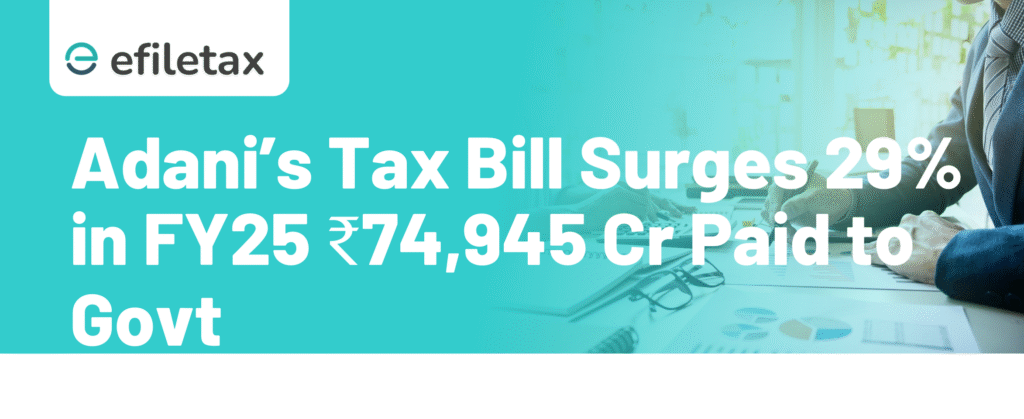
Introduction:
Adani Group tax contribution jumped 29% in FY2024–25, reaching a massive ₹74,945 crore. This surge isn’t just about one conglomerate’s growth—it’s a signal of rising corporate tax collections and India Inc’s growing compliance footprint. Here’s a breakdown of the numbers, sectors, and wider tax policy implications for Indian businesses.
Adani’s FY25 Tax Footprint: Key Highlights
| Particulars | FY24 | FY25 | YoY Growth |
|---|---|---|---|
| Total Tax Contribution | ₹58,125 crore | ₹74,945 crore | +29% |
| Corporate Tax (Direct) | ₹15,448 crore | ₹22,552 crore | +46% |
| Indirect Tax (incl. GST, Excise) | ₹42,677 crore | ₹52,393 crore | +22% |
| No. of Group Companies Paying | 17 | 17 | No change |
| Top Contributors | Adani Enterprises, Adani Ports, Adani Power | Same | Consolidated gain |
Source: Adani Group statement, verified by press releases and CBDT data
Focus Area: Adani Group Tax Contribution
Adani’s ₹74,945 crore tax payment includes direct and indirect taxes across energy, infrastructure, ports, logistics, and FMCG verticals. This reflects:
- Higher profitability of Adani Ports, Energy & Renewables
- Volume expansion in logistics and power distribution
- Better tax compliance and digital reporting via GSTN and e-Invoicing
- Supportive central policies in infrastructure capex
Policy Implications for Indian Businesses
What this trend suggests for other Indian companies:
- Rising scrutiny: Big taxpayers are increasingly under GST and IT radar
- Digital compliance: E-invoicing, e-way bill enforcement is closing tax gaps
- High revenue expectations: FY26 Budget likely to expect 12–14% growth in corporate tax collection
- Sectoral contribution shifts: Infra, ports, and energy now rival IT/finance in tax outflow
Expert Tip for Small & Mid Businesses
“Large firms like Adani are paving the compliance benchmark. MSMEs must now invest in smart ERP tools, timely GST reconciliation, and TDS management to avoid scrutiny and penalties.”
— Efiletax Consultant View
Trend Snapshot: Other Giants vs Adani
| Group Name | FY25 Est. Tax Paid | Sectoral Focus |
|---|---|---|
| Reliance | ₹98,000+ crore | Oil, Telecom, Retail |
| Tata Group | ₹84,000 crore | Auto, IT, Power, Steel |
| Adani Group | ₹74,945 crore | Infra, Ports, Energy |
| Infosys/Wipro | ₹22,000–25,000 crore | IT Services |
This puts Adani in India’s top 3 corporate taxpayers for the year.
Conclusion
The 29% jump in Adani Group tax contribution shows India’s top corporates are fueling not just growth—but the government’s fiscal strength. For business owners, the message is clear: compliance, digital readiness, and proactive reporting are now non-negotiable.
Need help managing tax compliance like a pro?
👉 Get expert support with Efiletax
FAQ Section
Q1. Does Adani Group pay more in direct or indirect taxes?
Indirect taxes (GST, Excise, Customs) account for over 70% of its contribution, but direct tax (Income Tax) is growing fast.
Q2. What triggered the sharp rise in FY25 tax payments?
Expansion in core sectors, increased revenues, and stricter compliance post-2022 reforms.
Q3. Can MSMEs learn from large groups like Adani?
Yes. They must adopt digital tax practices early to stay compliant and scalable.
Summary
Adani Group tax contribution rose 29% to ₹74,945 crore in FY25, making it one of India’s top taxpayers. Breakdown, policy impact & lessons for MSMEs inside.